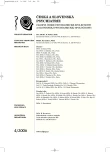Place and Value of Electroencephalography in Current Psychiatry
Miesto a hodnota elektroencefalografie v súčasnej psychiatrii
Hodnota elektroencefalografie v psychiatrickej diagnostike býva často zdrojom pochybností pre zdanlivú nešpecificitu nálezov pri psychických poruchách. Ako ukazuje výskum i prax, zrejmé podobnosti medzi vzorcami EEG a rôznymi psychickými poruchami nemusia byť nutne interpretované ako nešpecifické. Skôr by mali byť chápané ako naznačujúce podobnosti základných procesov. Zdokonalením techník analyzujúcich EEG sa rozvíja potenciálna využiteľnosť elektroencefalografie pre skríning psychických porúch a pravdepodobne sa aj jej pomocou podarí identifikovať mechanizmy mozgu podieľajúce sa na ich vzniku a rozvoji.
Kľúčové slová:
elektroencefalografia, hodnota EEG, indikácie EEG v psychiatrii.
Authors:
M. Drímalová; J. Dragašek
Authors‘ workplace:
Psychiatrická klinika JLF UK a MFN, Martin
prednosta doc. MUDr. I. Ondrejka, Ph. D.
Published in:
Čes. a slov. Psychiat., 102, 2006, No. 4, pp. 189-194.
Category:
Comprehensive Reports
Overview
The value of the electroencephalography in psychiatric diagnosis has frequently been questioned because of the evident nonspecificity of findings when comparing different psychiatric groups to normal control subjects. On the basis of the preceding, it would appear that the gross similarities seen between the EEG patterns of various psychiatric groups should not necessarily be interpreted as reinforcing the concept of nonspecificity of the EEG. Rather, such similarities could be interpreted as denoting similarities of the underlying processes. Further refinement of patient subgrouping and EEG analysis techniques may develop the potential usefulness of the EEG for patient screening and identification of probable CNS mechanism underlying various psychiatric disorders.
Key words:
electroencephalography, indication of EEG in psychiatry, value of EEG.
Labels
Addictology Paediatric psychiatry PsychiatryArticle was published in
Czech and Slovak Psychiatry

2006 Issue 4
- Memantine in Dementia Therapy – Current Findings and Possible Future Applications
- Memantine Eases Daily Life for Patients and Caregivers
- Hope Awakens with Early Diagnosis of Parkinson's Disease Based on Skin Odor
- Deep stimulation of the globus pallidus improved clinical symptoms in a patient with refractory parkinsonism and genetic mutation
-
All articles in this issue
- Antidepressant Therapy: Choice Based on CYP2D6 Activity and Gender
- Place and Value of Electroencephalography in Current Psychiatry
- Remission – a New Tool for Assessment of Treatment Efficacy
- Suicidal Behavior in Medical Praxis
- Velafaxine and Anxiety Disorders
- Sexual Abuse and Rape Experiences in Female Schizophrenic Patients
- Czech and Slovak Psychiatry
- Journal archive
- Current issue
- About the journal
Most read in this issue
- Velafaxine and Anxiety Disorders
- Sexual Abuse and Rape Experiences in Female Schizophrenic Patients
- Remission – a New Tool for Assessment of Treatment Efficacy
- Place and Value of Electroencephalography in Current Psychiatry
